js 逆向
自用油猴脚本
准备工作
你需要知道的网站运行的时间轴
url-->加载 html-->加载 js-->运行 js 初始化-->用户触发某个事件--调用了某段 js-->明文数据-->加密函数-->加密后的 数据-->send(给服务器发信息{XHR--SEND}) -->接收到服务器数据-->解密函数-->刷新函数-->刷新网页渲染
认识浏览器的调试功能
❝
Chrome 高阶调试指南:https://zhuanlan.zhihu.com/p/62177097

如何快速定位加解密函数
- 搜索关键字:登陆时的 uri、passwd、Encrypt、Decrypt、.....
- 使用一个神奇的脚本提高效率:https://github.com/Cha111Ng1/Tampermonkey_cha11/blob/main/HookScript.js
如何利用加解密函数
❝
有一些加密函数是可以直接扣出来使用的,而有一些却不能,以下是测试过程中我常用的三种方式。
- 复原原加密逻辑
- 抠出原有 js
- rpc 主动调用
当你懒,你会用什么工具?
❝
项目地址:https://github.com/Cha111Ng1/Tampermonkey_cha11
一个渗透测试油猴脚本库,整理常用脚本
HookScript.js
- 一些用于 hook 的常用断点+禁用无限 debug
// ==UserScript==
// @name 「Hook Script」fuck断点
// @namespace http://tampermonkey.net/
// @version 0.1
// @description 一些用于hook的常用断点,禁用无限debug
// @author Cha111Ng1
// @match http*://*/*
// @icon
// @grant none
// @run-at document-start
// ==/UserScript==
(function () {
// 取消vm debug
(function () {}).constructor === Function;
Function.prototype.constructor = function () {};
("use strict");
console.log("# ++++++++++++++++++++++++++++++++++++++++++");
console.log("# + 微信公众号:攻有道 By:Cha111Ng1 +");
console.log("# ++++++++++++++++++++++++++++++++++++++++++");
var userChoices = prompt(
" ━━━━━━️☠─────── \n请选择要启动的插件(多选用逗号分隔)\n ━━━━━━️☠─────── \n1. JSON.parse调用断点\n2. 每当尝试设置document.cookie时断点\n3.每当调用XMLHttpRequest时断点\n4.当发送POST请求时断点"
);
if (userChoices) {
var choicesArray = userChoices.split(",").map(function (choice) {
return choice.trim();
});
choicesArray.forEach(function (chosenPlugin) {
switch (chosenPlugin) {
case "1":
//alert("JSON.parse调用断点");
var _parse = JSON.parse;
JSON.parse = function (arg) {
console.log("[+]「油猴」JSON.parse调用断点:", arg);
debugger;
return _parse(arg);
};
break;
case "2":
//alert("每当尝试设置document.cookie时断点");
Object.defineProperty(document, "cookie", {
set: function (a) {
debugger;
},
});
break;
case "3":
//alert("每当调用XMLHttpRequest.prototype.open时断点");
var _open = XMLHttpRequest.prototype.open;
XMLHttpRequest.prototype.open = function (
method,
url,
async,
user,
password
) {
console.log(
"[+]「油猴」调用XMLHttpRequest.prototype.open断点:",
method,
url
);
debugger;
return _open.apply(this, arguments);
};
break;
case "4":
//alert("每当调用XMLHttpRequest.prototype.send时断点");
var _send = XMLHttpRequest.prototype.send;
XMLHttpRequest.prototype.send = function (data) {
console.log("[+]「油猴」POST请求发送数据:", data);
debugger;
_send.apply(this, arguments);
};
break;
default:
alert("未知插件:" + chosenPlugin);
break;
}
});
} else {
//alert("没有选择插件");
console.log("[x]没有选择插件");
}
})();NoDebugger.js
- 代码中禁用无限 Debugger
// ==UserScript==
// @name 代码中禁用无限Debugger
// @namespace http://tampermonkey.net/
// @version 0.1
// @description 禁用无限Debugger
// @author Cha111Ng1
// @match http*://*/*
// @icon
// @grant none
// @run-at document-start
// ==/UserScript==
(function () {
// 破解无限Debugger
var constructorHook = constructor;
Function.prototype.constructor = function (s) {
if (s == "debugger") {
return function () {};
}
return constructorHook(s);
};
const setInterval = window.setInterval;
window.setInterval = function (fun, time) {
// console.log(time, 'ddddd', fun.toString());
if (fun && fun.toString) {
var funString = fun.toString();
if (funString.indexOf("debugger") > -1) return;
if (funString.indexOf("window.close") > -1) return;
}
return setInterval(fun, time);
};
})();jsrpc.js
- 加解密 jsrpc 自动化脚本,配合 sekiro、Mitmproxy(可选)使用
// ==UserScript==
// @name jsrpc模版
// @namespace http://tampermonkey.net/
// @version 0.1
// @description 加解密jsrpc自动化脚本
// @author Cha111Ng1
// @match https://此处修改为需要使用的域名/*
// @icon
// @grant none
// @run-at document-start
// ==/UserScript==
// 需配合Sekiro、Mitmproxy(自行百度),需要找到加密位置,并把加密函数设置为全局函数,本例子为window._h(data),在源码加密函数下方插入`if (!window._h){window._h = h}`
// 例如:
// 加密
// http://127.0.0.1:5612/business-demo/invoke?group=test_cha11&action=encrypt&data=
// 解密
// http://127.0.0.1:5612/business-demo/invoke?group=test_cha11&action=decode&data=
(function () {
// 取消debug
(function () {}).constructor === Function;
Function.prototype.constructor = function () {};
("use strict");
console.log("# ++++++++++++++++++++++++++++++++++++++++++");
console.log("# + 微信公众号:攻有道 By:Cha111Ng1 +");
console.log("# ++++++++++++++++++++++++++++++++++++++++++");
// Your code here...
function SekiroClient(e) {
if (((this.wsURL = e), (this.handlers = {}), (this.socket = {}), !e))
throw new Error("wsURL can not be empty!!");
(this.webSocketFactory = this.resolveWebSocketFactory()), this.connect();
}
(SekiroClient.prototype.resolveWebSocketFactory = function () {
if ("object" == typeof window) {
var e = window.WebSocket ? window.WebSocket : window.MozWebSocket;
return function (o) {
function t(o) {
this.mSocket = new e(o);
}
return (
(t.prototype.close = function () {
this.mSocket.close();
}),
(t.prototype.onmessage = function (e) {
this.mSocket.onmessage = e;
}),
(t.prototype.onopen = function (e) {
this.mSocket.onopen = e;
}),
(t.prototype.onclose = function (e) {
this.mSocket.onclose = e;
}),
(t.prototype.send = function (e) {
this.mSocket.send(e);
}),
new t(o)
);
};
}
if ("object" == typeof weex)
try {
console.log("test webSocket for weex");
var o = weex.requireModule("webSocket");
return (
console.log("find webSocket for weex:" + o),
function (e) {
try {
o.close();
} catch (e) {}
return o.WebSocket(e, ""), o;
}
);
} catch (e) {
console.log(e);
}
if ("object" == typeof WebSocket)
return function (o) {
return new e(o);
};
throw new Error("the js environment do not support websocket");
}),
(SekiroClient.prototype.connect = function () {
console.log("sekiro: begin of connect to wsURL: " + this.wsURL);
var e = this;
try {
this.socket = this.webSocketFactory(this.wsURL);
} catch (o) {
return (
console.log(
"sekiro: create connection failed,reconnect after 2s:" + o
),
void setTimeout(function () {
e.connect();
}, 2e3)
);
}
this.socket.onmessage(function (o) {
e.handleSekiroRequest(o.data);
}),
this.socket.onopen(function (e) {
console.log("sekiro: open a sekiro client connection");
}),
this.socket.onclose(function (o) {
console.log("sekiro: disconnected ,reconnection after 2s"),
setTimeout(function () {
e.connect();
}, 2e3);
});
}),
(SekiroClient.prototype.handleSekiroRequest = function (e) {
console.log("receive sekiro request: " + e);
var o = JSON.parse(e),
t = o.__sekiro_seq__;
if (o.action) {
var n = o.action;
if (this.handlers[n]) {
var s = this.handlers[n],
i = this;
try {
s(
o,
function (e) {
try {
i.sendSuccess(t, e);
} catch (e) {
i.sendFailed(t, "e:" + e);
}
},
function (e) {
i.sendFailed(t, e);
}
);
} catch (e) {
console.log("error: " + e), i.sendFailed(t, ":" + e);
}
} else this.sendFailed(t, "no action handler: " + n + " defined");
} else this.sendFailed(t, "need request param {action}");
}),
(SekiroClient.prototype.sendSuccess = function (e, o) {
var t;
if ("string" == typeof o)
try {
t = JSON.parse(o);
} catch (e) {
(t = {}).data = o;
}
else "object" == typeof o ? (t = o) : ((t = {}).data = o);
(Array.isArray(t) || "string" == typeof t) && (t = { data: t, code: 0 }),
t.code ? (t.code = 0) : (t.status, (t.status = 0)),
(t.__sekiro_seq__ = e);
var n = JSON.stringify(t);
console.log("response :" + n), this.socket.send(n);
}),
(SekiroClient.prototype.sendFailed = function (e, o) {
"string" != typeof o && (o = JSON.stringify(o));
var t = {};
(t.message = o), (t.status = -1), (t.__sekiro_seq__ = e);
var n = JSON.stringify(t);
console.log("sekiro: response :" + n), this.socket.send(n);
}),
(SekiroClient.prototype.registerAction = function (e, o) {
if ("string" != typeof e) throw new Error("an action must be string");
if ("function" != typeof o) throw new Error("a handler must be function");
return (
console.log("sekiro: register action: " + e),
(this.handlers[e] = o),
this
);
});
var client = new SekiroClient(
"ws://127.0.0.1:5612/business-demo/register?group=test_cha11&clientId=" +
Math.random()
);
// 加密接口1
client.registerAction("encrypt", function (request, resolve, reject) {
var data = request["data"];
console.log("[+]「油猴加密」明文:", data);
var cha = window._v(data);
console.log("[+]「油猴加密」密文:", cha);
resolve(cha);
});
// 解密接口1
client.registerAction("decode", function (request, resolve, reject) {
var data = request["data"];
console.log("[+]「油猴解密」密文:", data);
var chaa = window._h(data);
console.log("[+]「油猴解密」明文:", chaa);
resolve(chaa);
});
})();实战
脚本简单演示
❝
接下来我们通过一个简单的示例,初步的了解并应用以上的内容,由于是教你偷懒的教程,so 这边直接使用最快捷的方式进行操作。
例子 1:寻找加密位置「HookScript.js」
首先我们使用 HookScript.js 脚本快速定位发送请求的位置,此处我们选择方式 4:
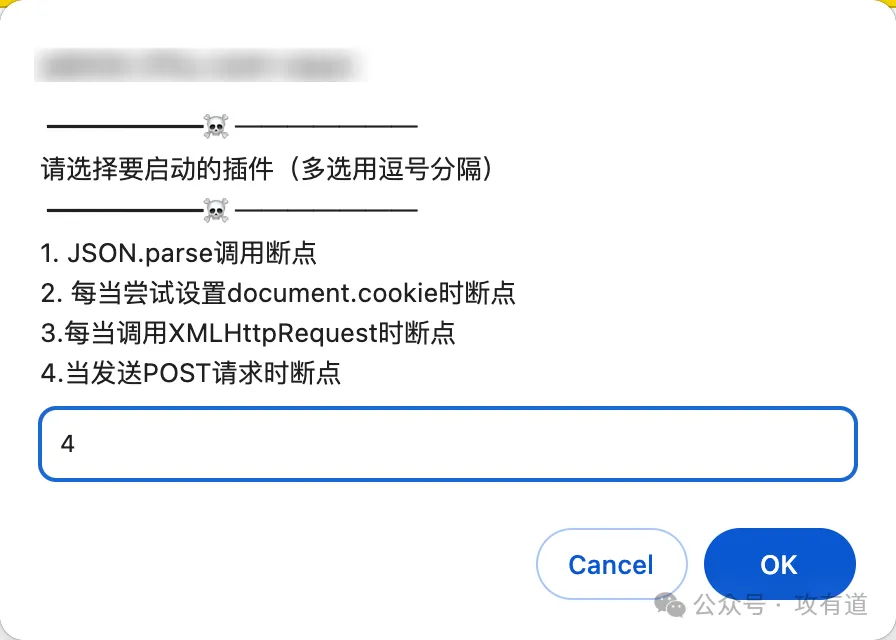
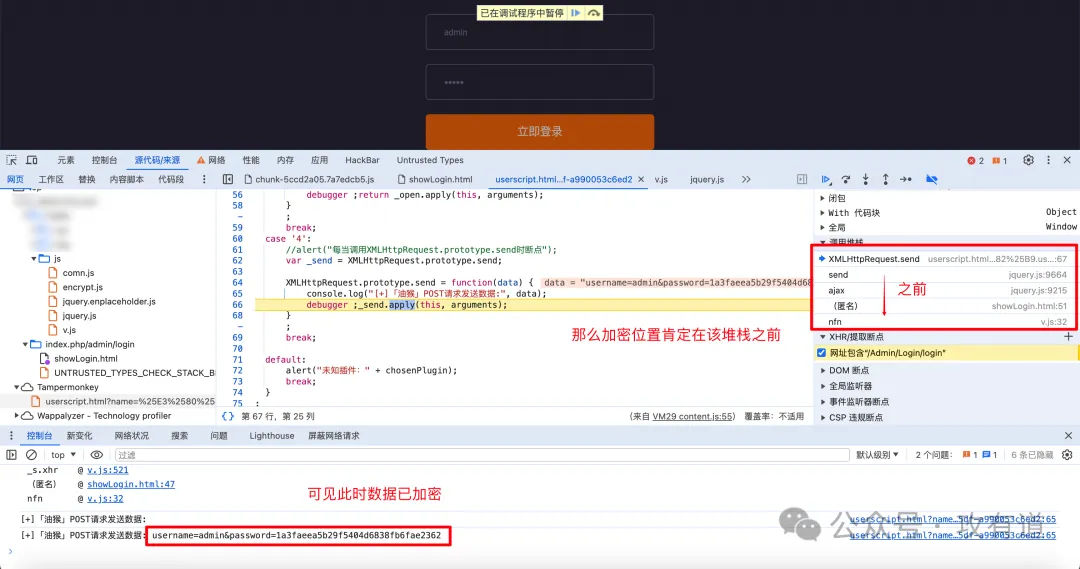
相同密码多次重复登陆但其值不一样可判断其加盐了

点击堆栈 nfn,然后下断点逐步调试,最终获得加密位置,然后可根据该加密流程写对应的脚本进行后续的渗透测试等操作。
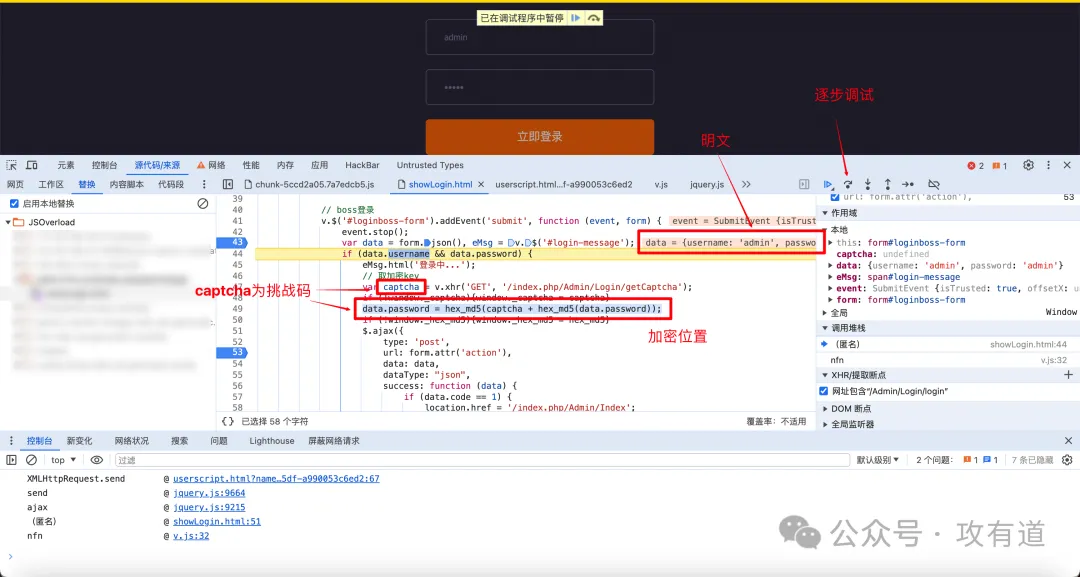
例子 2:jsrpc 主动调用「jsrpc.js」
启动 sekiro
❝
# win 运行
bin/sekiro.bat
# linux 运行
bin/sekiro.sh
# mac 运行
bin/sekiro
浏览器加载脚本,为方便,所以写成了油猴脚本jsrpc.js,加载油猴脚本
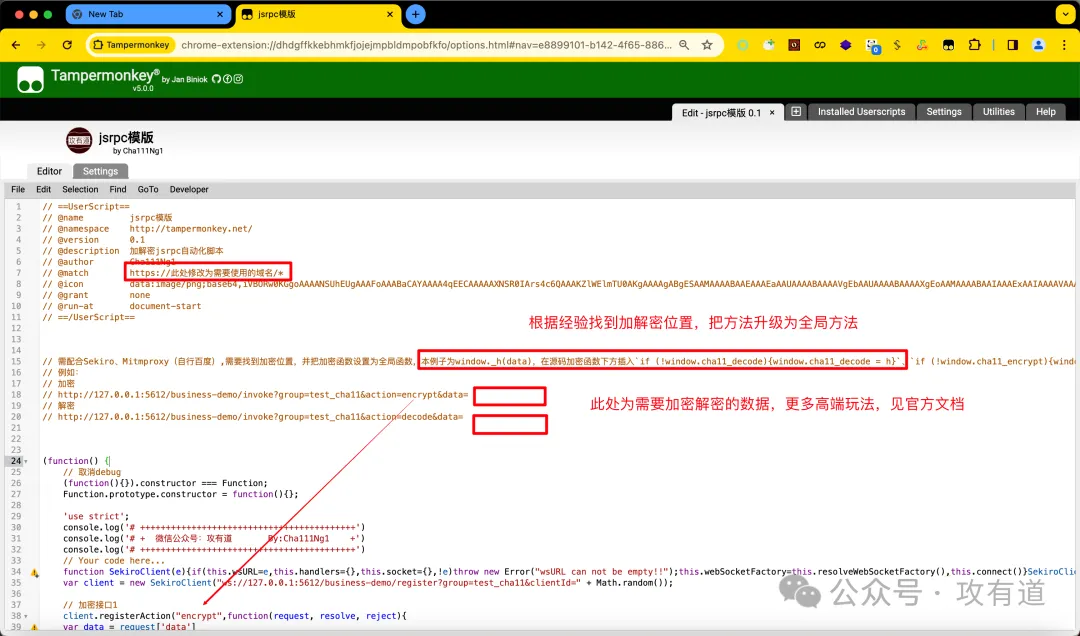
登陆暴力实战「yakit+sekiro+油猴」
本例子:
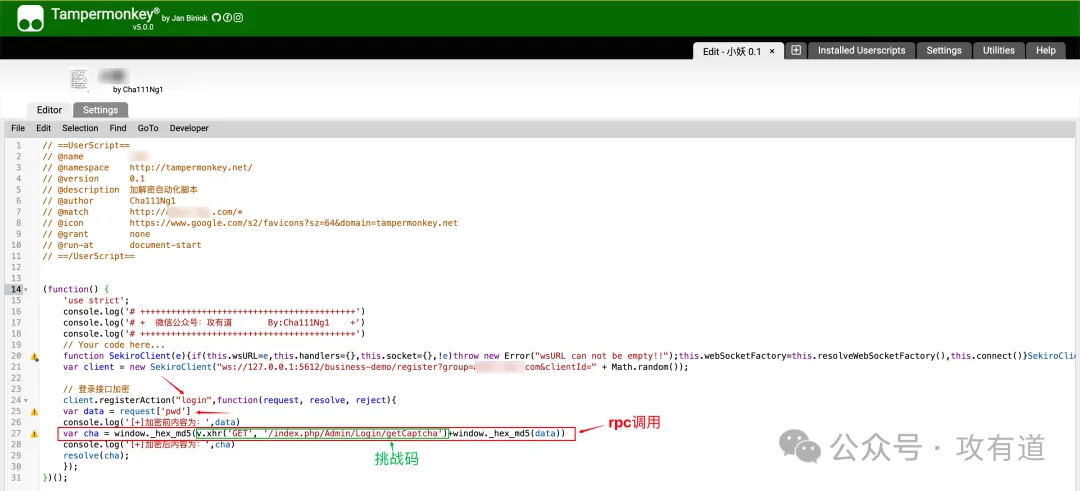
配置完成后启用,并测试:
http://127.0.0.1:5612/business-demo/invoke?group=xxxxxxxx&action=login&pwd=``<明文>
使用 yak 进行暴力破解
❝
官方教程:https://www.yaklang.io/products/Web Fuzzer/fuzz-sequence
请求包 1 配置:
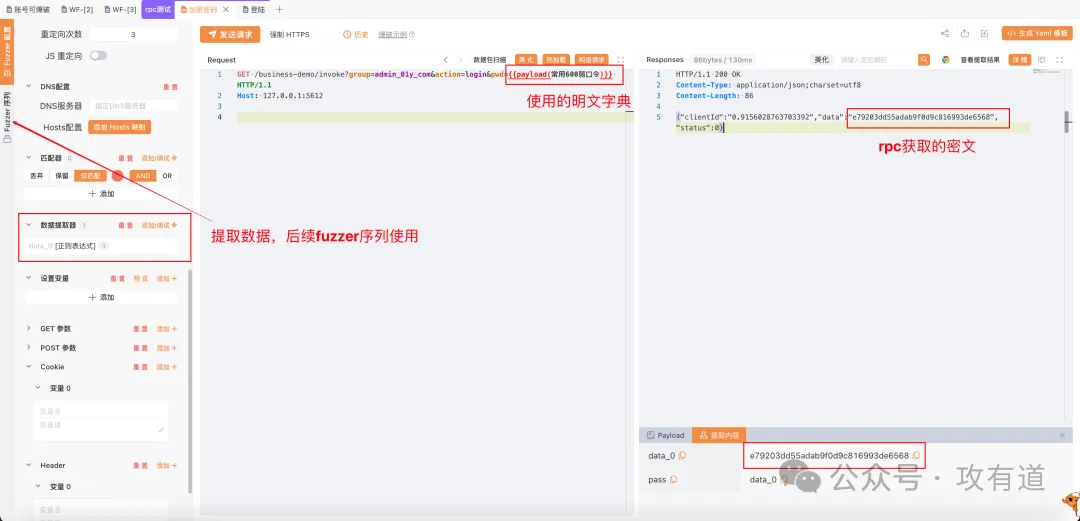
请求包 2 配置:
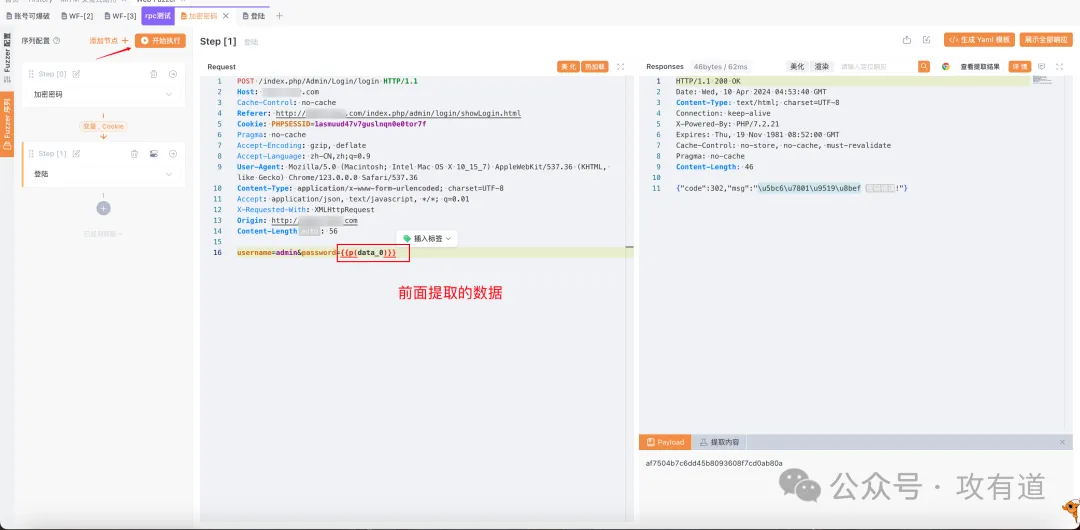
开始执行,即可对密码进行暴力破解,以下为效果演示
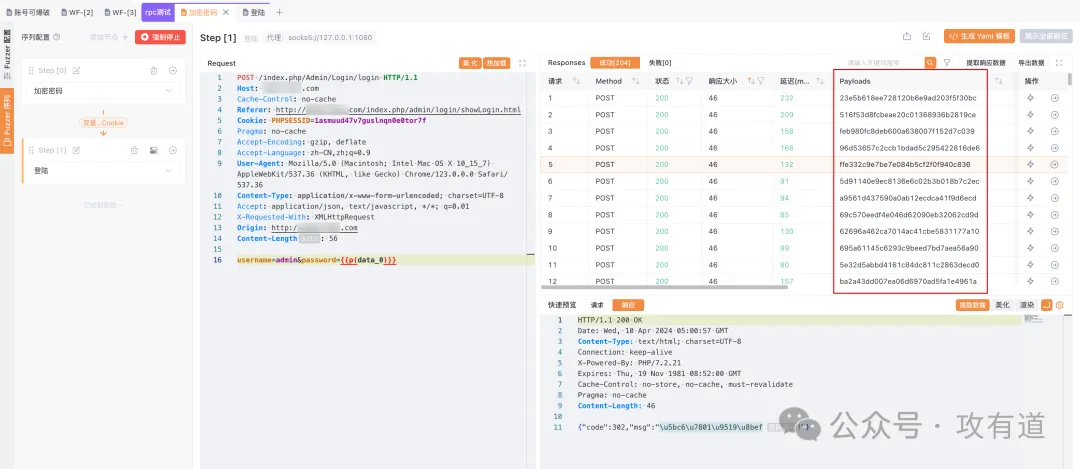
拓展资料
sekiro 官方手册:https://sekiro.iinti.cn/sekiro-doc
Chrome 高阶调试指南:https://zhuanlan.zhihu.com/p/62177097
